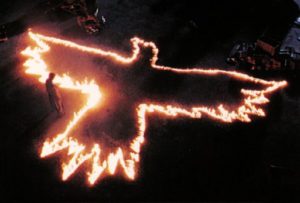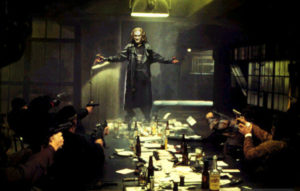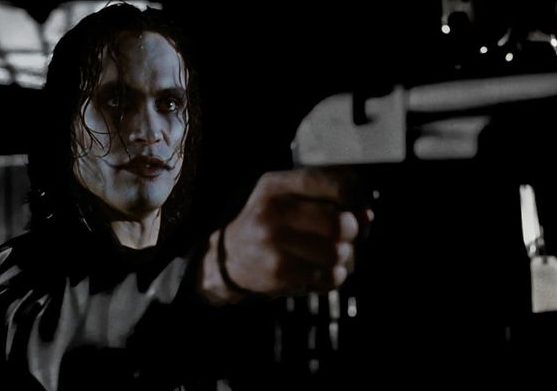While director Alex Proya’s “The Crow” would become famous for its on-set tragedy (actor Brandon Lee was accidentally killed during filming when a real bullet was fired at him from a prop gun by co-star Michael Massee), the real testament to its success lies in its status as a cult classic that has held up over time.
The ‘crow’ in this film refers to not a bird, or a man hell-bent on revenge, but a mystic power that has the ability to raise people from the dead in order to right wrongs. The film is every bit as dark as its filming style, and mixes rain, gothic architecture, and its own brand of violence with a classic revenge tale. The result is decidedly worth the effort.
The basic story here is that a rock guitarist Eric Draven (Brandon Lee) and his girlfriend Shelly (Sofia Shinas) are brutally murdered on a night of the year called ‘Devil’s Night’ (the night before Halloween) by a gang of criminals. Through later exposition we learn that the murder has to do with a tenant complaint lodged by Shelley in a town ruled by criminals and outlaws; however the event is cast early in the film in the light of disbelief it deserves. Shaky cameras and an erratic filming style make the event all the more terrible. Draven is shot and falls from his multistory loft apartment, landing dead on the streets below.
A year later, a mysterious crow brings Draven back to life to hunt down the gang that murdered he and Shelly on that fateful night.

As a revenge tale, “The Crow” is a perfect practitioner of the tale, its protagonist cast in mystery and its events detailed in a straightforward yet tortured way. There’s no tongue in cheek dialogue as in films like “Kill Bill,” or drawn out scenes of murder. Draven is cast as a dark, tortured soul in a dark tortured city (the majority of the film is shot at night, in a never ending rain), and there’s nothing glorified about what he’s doing – though there is something necessary. What has happened to him is truly awful – all the more awful as we learn he and his girlfriend were to get married the day after their murder – and we believe in his quest to seek out those who have done him wrong in the name of justice.
Cinematically the film is flawless, and seems in no way to mirror its filming locations of Wilmington, North Carolina and Los Angeles. Released in 1994, the film predates others such as “Sin City” and “Batman Begins” but its cityscape and stylings are reminiscent of both films. Rain soaked alleys and streets, a town ruled by criminals, and gothic, archaic architecture highlight the film’s run-time. In a wonderful shot, Lee is silhouetted from the ground up standing in his old loft apartment, which looks more Parisian cathedral than apartment. And most of the city – it’s hangouts, its streets, and its camera flyovers effectively predict ‘The Narrows’ in Christopher Nolan’s “Batman Begins.” Nolan clearly garnered inspiration from “The Crow” for much of his film – a testament to a movie that occurred 11 years before his.
 The film’s acting and dialogue are effective and real, and make the proceedings deeper, rather than wasting them on mere action as some revenge films make the mistake of doing. Lee appears a force to be reckoned with.
The film’s acting and dialogue are effective and real, and make the proceedings deeper, rather than wasting them on mere action as some revenge films make the mistake of doing. Lee appears a force to be reckoned with.
His interactions with his foes are rightfully brutal and sardonic, but with his friends (such as a young girl named Sara he knew in life and a friendly police officer), he is kind, loving, heartbroken. The two are played by Rochelle Davis and Ernie Hudson respectfully, and have terrific chemistry with Lee. The dialogue is also tight, exposing more serious undertones than garnered at first glance. “Little things used to mean so much to Shelly – I used to think they were kind of trivial. Believe me, nothing is trivial,” Draven narrates in one touching scene.
The villains in the film range from laughable (such as Massee’s ‘Funboy’) to serious (“Robin Hood: Prince of Thieves’” Michael Wincott), and the film’s greatest triumph lies in the message it imparts. “The Crow” is made of deeper material – but it’s deep because it hints, rather effectively, at its characters’ painful emotions, and not because of action sequences or plot twists. It’s actors, set pieces, and cinematography come together to make a top notch revenge tale, all the more surreal due to Lee’s on-set tragedy. If you haven’t seen the film, or are looking for a revenge film better than the rest, give “The Crow” a try. You won’t be disappointed.
– by Mark Ziobro


